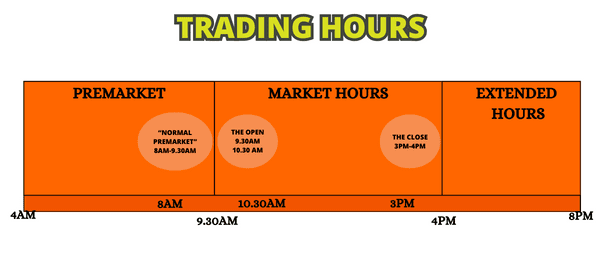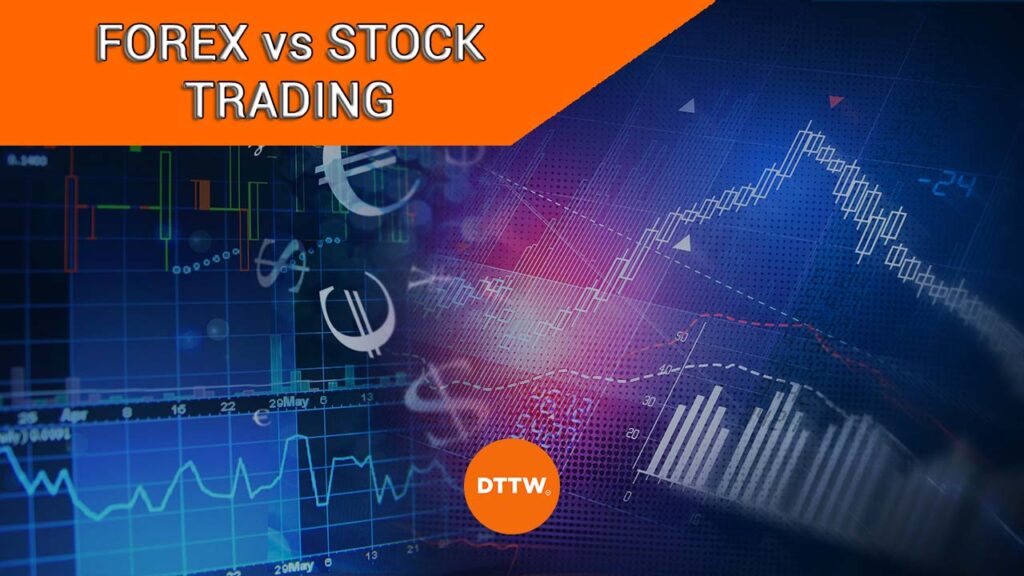Foreign exchange (forex) and stocks are two of the most popular assets in day trading and investing.
The daily volume of currencies traded every day is worth over $5 trillion while the total market cap of all global stocks stands at over $63 trillion.
In this article, we will compare forex and stocks and identify the best ones to day trade.
What is forex?
Forex refers to the currency market. The concept behind forex is relatively simple since it involves identifying changes in the value of a currency pair.
For example, assume that you are traveling from Japan to the United States and you have 100,000 JPY and the exchange rate stands at 144.91. In this case, you will have $690.
When coming back, the exchange rate has risen to 150 and you still have $690. Your total funds in yen will be 103,500. As such, your profit will be 3,500 yen. Forex trading aims to take advantage of these price movements on a large scale.
What are stocks?
Stocks, also known as shares or equities, refer to small chunks of publicly-traded companies. When you buy a stock, you are simply an owner of a company, meaning that you can share its profit and even take part in its decision-making.
Assuming that a company is valued at $10 million and you buy shares worth $1 million, it means that you own about a tenth of the company. If the company makes a profit of $500,000 and decides to distribute it through dividends, it means that you will receive some cash.
In the next part, we will look at the differences between stocks and forex. We will then conclude on the best assets to trade.
Forex vs. Stock: key differences
Market size and liquidity
A key difference between forex and stocks is the total market size. In the case of forex, currencies are usually listed in pairs like EUR/USD, GBP/USD, and USD/JPY. This happens since you need to exchange one currency for the other.
There are hundreds of currency pairs that you can trade. These pairs are divided into majors, minors, and exotics.
Majors are made up of developed country currencies and must include the US dollar. They include EUR/USD and USD/JPY.
Minors are made up of developed countries and must exclude the USD. Examples of the pairs are EUR/GBP and AUD/GBP.
Forex exotics are made up of emerging market currencies and developed ones. Examples of these are USD/TRY and EUR/ZAR. In all, the daily volume of forex pairs traded every day stands at more than $5 trillion.
Stocks, on the other hand, are significantly more than currency pairs. In the US, there are more than 6,000 shares, with the most valuable ones being Apple, Microsoft, and Amazon.
Globally, there are over 10,000 equities. The daily volume of stocks traded globally is about $1 trillion though the number changes quite a bit.
Liquidity is another important aspect in the market since it identifies the ease of entering and exiting trades.
Forex and stocks are highly liquid assets. However, some smaller components have some liquidity challenges. For example, in forex, some exotics like TRY/ZAR and BRL/MXN are not liquid, making them more expensive to trade.
Trading hours
The other key difference between stocks and forex is trading hours. The forex market is usually open for 24 hours, five days a week. It opens on Sunday evening and closes on Friday night. This happens since forex is a global market.
Related » How Long is a Business Day for Day Traders?
Stocks, on the other hand, have a smaller trading window since markets are open for a small part of the day. In the US, the regular session starts at 09:30 AM and closes at 4 pm.
US equity traders can, however, trade in the pre-market and extended hours. Most stock markets are usually open for less than 10 hours Monday to Friday.


Stock traders can use platforms like Real Trading that provide equities from more countries to trade for longer hours. The challenge for this is that these stocks are usually listed in their local currencies.
Dividends
Another difference between stocks and forex is how to make money. In forex, the only way to make money is through price changes. In the case of EUR/USD pairs, you will benefit when the price rises.
The same happens in stocks. However, for some equities, you can make money when they pay dividends. A dividend is a share of profits that is distributed to equity holders. This option only applies to investors though. Day traders and scalpers do not hold the stock enough!
What affects prices
Forex and stocks are impacted by different things. Some of the top movers for currencies are economic data like inflation, jobs, and manufacturing.
The most important movers are interest rate decisions by central banks like the Fed, Bank of England, and European Central Bank (ECB). Some currencies are affected by the prices of key commodities like crude oil and natural gas.
Stocks, on the other hand, are moved by different catalysts. For example, they are affected by things like earnings, mergers and acquisitions (M&A), monetary and fiscal policy, and company-specific news.
What is traded
The primary difference between stocks and forex is the assets that are traded. In stocks, people buy and sell portions of publicly-traded companies.
On the other hand, in forex, people speculate on currency movements in the market. And, as we said, they benefit from the spread of the two prices.
Regulations
Forex and stocks are both highly-regulated assets. These regulations happen because of the risks involved and the need to protect traders. All countries have their regulators. For example, the US has the Securities and Exchange Commission (SEC) and the Commodity Futures Trading Commission (CFTC)
The UK has the Financial Conduct Authority (FCA) while the blanket regulator in Europe is ESMA. The other regulators are the Australia Securities Investment Commission and CySec.
The forex market is more regulated than stocks in some countries. Some of these regulations relate to leverage and margin. Stocks are also regulated since they are securities. For example, companies must disclose important information like when management changes and acquisitions.
Taxes
Taxation is an important concept in the financial market. This taxation usually depends on countries. In most cases, traders usually are required to pay their taxes on capital gains. However, you should do your research on taxation.
Related » Tax Strategies for Day Traders
Forex vs stocks: Similarities
Forex and stocks have also some similarities. Let’s briefly go through what are the most popular (and also the most important) commonalities.
Margin and leverage
One of the similarities between margins and leverage. Leverage refers to a loan that is provided to a trader to maximize their opportunities. For example, if you have $1,000, a 500 leverage will give you a purchasing value of $500,000.
When things go right, you will make more money. On the other hand, if things go south, you will lose more money. Brokers provide their traders with leverage.
Catalysts
The other similarity is that the two have some similar catalysts. For example, the two assets are affected by things like monetary and fiscal policy. Monetary policy refers to the actions of central banks while fiscal policy is related to governments.
For example, the US dollar and stocks react to Fed hikes and cuts differently. The US dollar rises when the Fed hikes rates while stocks tend to drop in hikes. In fiscal policy, the US dollar drops when there is a huge stimulus package.
Risk management
The other similarity is that stocks and forex are both risky assets to trade. It is possible to make a lot of money or lose money, depending on how our analysis goes.
This lead to a similarity in risk management because of the risks involved when trading the two. Some of these management strategies are position-sizing, leverage, closing overnight trades, and having a stop-loss and a take-profit.
Trading approaches
The other similarities are the trading approaches in the market. Some of these strategies are scalping, swing trading, technicals, and fundamental analysis.
Scalping is a strategy where people buy and sell assets within a few minutes. In swing trading, they buy and hold for a few days. Therefore, stock and forex traders use the same approach to analyze.
Summary: Which is more profitable?
So, which is more profitable between stocks and forex? We believe that it is possible to make money both trading stocks and forex. It all depends on how you master your strategy!
Some of the factors to weigh in are individual preferences, risk appetite, and market understanding. The strategies and disciplines that guide successful trading are applicable across both domains, with adaptability and informed decision-making serving as cornerstones of profitability.
Whether navigating the rapid pace of forex or the intricate world of stocks, traders must remember that mastering these markets demands not only market knowledge but also a deep understanding of oneself and the psychological dynamics of trading.
In conclusion, whether you’re drawn to one of the two assets, the world of trading offers a wealth of opportunities, each requiring dedication, strategy, and a commitment to continual learning.
External useful resources
- Forex Trading vs. Stock Trading: What’s the Difference? – The Balance
